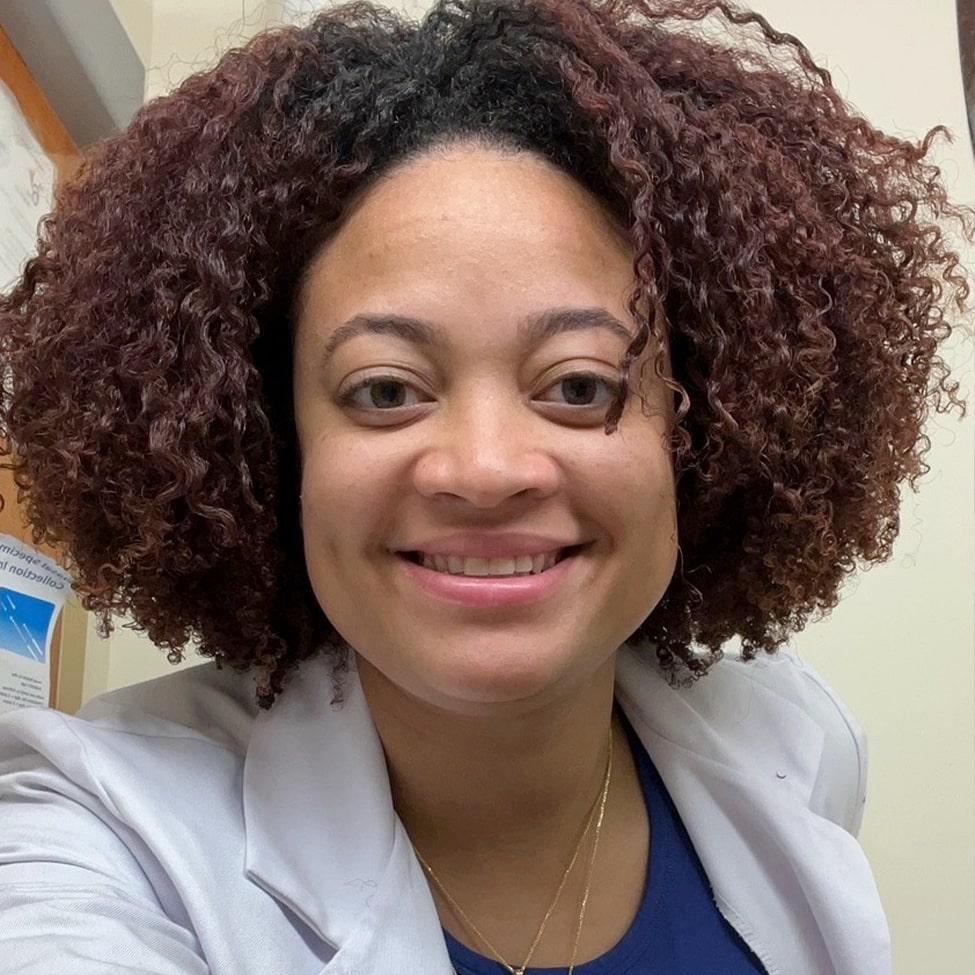
PhD in Nursing Student Rachel Robins, MSN: A Dive Into Maternal Health in Marginalized Communities


Rachel Robins, MSN, CNM, is a dedicated professional excelling in both academia and clinical practice. Currently pursuing her PhD in Nursing at Pace University, Rachel's research focuses on the assessment and interventions for postpartum depression among Black women in New York City. This passion stems from her deep concern over the disparities in maternal care these women often face.
In addition to her doctoral studies, Rachel is a nurse midwife at NYU Langone Health, where she plays a pivotal role in labor and delivery. Her extensive clinical experience includes practicing at a Brooklyn walk-in GYN clinic, fertility clinic, and she previously held a clinical faculty position at Plaza College.
Most recently, Rachel has been selected as a 2024 Jonas Scholar; a program that aims to improve health care by expanding the pool of PhD and DNP-prepared nurses needed to educate the next generation of nurse leaders. She joins a prestige group of 63 of the nation’s most promising doctoral nursing students selected for their “passion for teaching, academic excellence, and research prowess.”
We connected with Rachel to learn more about her passion behind the topic of Black maternal health, and how the Pace University PhD program has helped her academic and professional journeys.
What inspired your PhD focus, and how does this align with your personal and professional goals?
My focus on maternal health in marginalized communities stems from my experiences as a nurse midwife and labor and delivery nurse. During my time in these roles, I was confronted with the harsh reality of the Black maternal mortality rate in the United States, where Black women are 3-4 times more likely to die due to childbirth compared to their white counterparts. As a Black woman, this struck me deeply, fueling a desire to drive meaningful change for Black women in all aspects of maternal health.
I aim to develop evidence-based strategies for hospitals and healthcare systems to address and reduce these disparities. My goal is to advocate for systemic changes to ensure Black women receive the care and respect they deserve during childbirth. This endeavor is both a professional pursuit and a personal mission to transform Black maternal mortality from a statistic into a significant achievement of change.
Can you describe the specific aspect of maternal health you are researching and why you chose this particular issue?
I chose to focus my research on a less explored but equally vital aspect of maternal health: the postpartum period. Black women face higher rates of preterm birth, preeclampsia, and other adverse outcomes, but what about those who survive these traumatic experiences and enter the postpartum period?
Black women who have endured such traumatic births have a noticeable gap in research and interventions tailored to this phase of maternal health. My research is dedicated to understanding and addressing these unique challenges.
I aim to identify effective interventions that can support Black women in recovering both physically and emotionally after childbirth, ensuring they receive the care they need long after delivery. By focusing on this crucial period, I hope to contribute to a more comprehensive approach to Black maternal mental health that extends beyond survival and into holistic well-being.
What unique challenges have you encountered in your research concerning maternal health in marginalized communities, and how has Pace University helped?
One of the unique challenges I've encountered is the scarcity of focused studies on postpartum depression, specifically among Black women. Although research exists for other racial groups, data specific to Black women is limited, despite being disproportionately affected by adverse outcomes during childbirth, which are significant risk factors for developing postpartum depression. My research is driven by a need to understand why Black women, who are at the forefront of experiencing these adverse outcomes, are not equally represented in the studies.
Pace University’s PhD program has been instrumental in helping me navigate this complex issue. The university has provided me access to many research resources and guided me in refining my ideas, which has helped me develop my approach and ensured that my research is both impactful and relevant to the communities I aim to serve.
— Rachel Robins, MSN
Can you provide an example of how your research findings have influenced or could potentially influence maternal health practices or policies for marginalized populations?
My work has the potential to influence maternal health practices and policies by emphasizing the need for targeted, evidence-based interventions that specifically address the unique challenges faced by Black women during the postpartum period. For example, my findings could be used to advocate for the implementation of screening protocols that are more attuned to the risk factors prevalent in Black women, ensuring early detection of postpartum depression. Additionally, it could have culturally tailored mental health support programs that are accessible and responsive to the needs of Black mothers.
What skills or knowledge have you developed during your career and time in the PhD program, and how do you apply them to your research?
Working in marginalized communities and those with abundant resources has given me insights into the stark disparities in healthcare access and outcomes. The contrast between these environments is profound, not just in terms of access to treatment but also in the availability of essential resources. This experience has shaped my research by showing areas where change is most needed.
I've developed an understanding of the social determinants of health and how they disproportionately affect marginalized populations. I've also honed my ability to identify gaps in care and resource allocation, guiding my research focus.
How does the PhD program help you identify perspectives and needs of marginalized communities in your research and clinical practice?
The PhD program has been invaluable in helping me integrate the perspectives and needs of marginalized communities into both my research and clinical practice. The guidance of my mentors and professors has been particularly crucial in shaping my understanding of the research approach required to achieve my goals.
Through their mentorship, I've learned how to identify the unique challenges faced by marginalized communities and how to incorporate these insights into my research. This has enabled me to develop more relevant and effective interventions addressing these populations' needs. Their support has also strengthened my clinical practice by encouraging a more holistic and inclusive approach to patient care, ensuring that the voices and experiences of marginalized communities are always at the forefront of my work.
How has the Pace University PhD program impacted your thesis?
The collaborative environment at Pace has been instrumental in my work and research. Working closely with my cohort and having access to other cohorts has provided me with diverse perspectives that have significantly shaped my research. The ability to brainstorm ideas with my classmates has been great because it has allowed me to see what approaches work and what don’t, helping me refine my research. This collective exchange of ideas and experiences has improved the quality of my study and fostered a supportive community that has made me grow as a PhD student.
What drew you to the CHP PhD in Nursing program?
I knew I wanted to pursue research and that the PhD in Nursing was right for me, but choosing the right school was more challenging. My time working at NYU played a pivotal role in my choice. I connected with someone currently in a different cohort at Pace University, and she spoke highly of the support, mentorship, and sense of community she experienced there.
While researching other schools, I found that the qualities she described were less evident elsewhere. It became clear that the Pace University PhD program was genuinely invested in helping students achieve their goals. After joining the program, it exceeded my expectations. The faculty's support and dedication have confirmed that I made the right choice and enriched my educational journey in ways I hadn’t anticipated.
How has the PhD in Nursing program supported you in your educational journey?
The PhD in Nursing program at Pace has been incredibly supportive in my educational journey, offering mentorship, opportunities, and a strong sense of community. The professors here genuinely want you to succeed, which shows in everything they do. They are always available to answer questions, help you think critically, and guide you in honing your research skills. Their unwavering support makes the challenging journey of earning a PhD feel attainable and deeply rewarding.
The professors' passion for research truly sets the program apart, which shines through in every class. Their contagious enthusiasm has made my experience in the program inspiring. Being part of such a dedicated and supportive community has made all the difference in my progress and confidence as a researcher.
— Rachel Robins, MSN
What are your future career plans after completing your PhD, and how do you plan to continue addressing maternal health disparities in marginalized communities?
My primary goal is to establish a dedicated team in NYC focused on research in the Black maternal health community. I aim to develop standardized interventions and improvements across hospitals that ensure equitable care for Black women. I plan to work on influencing policy changes that promote implementing these standardized practices across healthcare systems. By collaborating with hospitals, community organizations, and policymakers, I want to ensure that our research translates into tangible improvements in maternal health outcomes.
I also aspire to contribute to academic literature by publishing my findings and sharing successful intervention models that can be adopted nationwide. My long-term vision is to see a significant reduction in adverse outcomes for Black women and to establish a legacy of research-driven change that empowers marginalized communities. Teaching and mentoring the next generation of healthcare professionals to continue this critical work is also a part of my plans, as education and advocacy are vital to sustaining and expanding these efforts.
Learn more about the PhD in Nursing program at Pace University.


